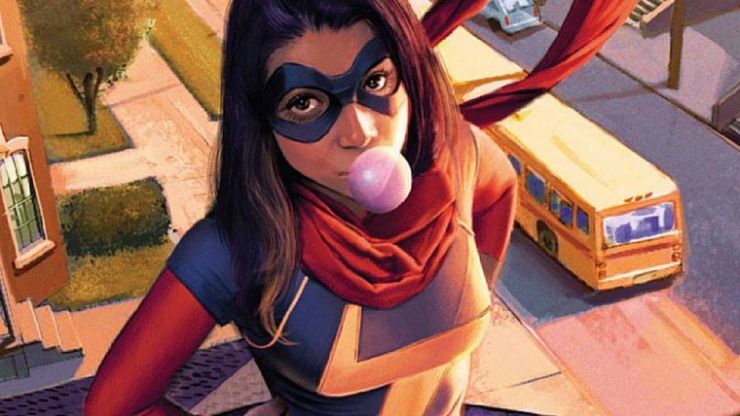Marvel Studios has revealed plans for a film portraying the story of Kamala Khan, aka Ms Marvel – a Pakistani Muslim teenage superhero – on the big screen. With comic book movies largely dominated by white men – and rarely engaging religion – her inclusion will be a welcome move.
President of Marvel Studios Kevin Feige told the BBC he had 'plans' for the 'Muslim hero' Ms Marvel to join the Marvel Cinematic Universe (MCU) once Captain Marvel (the heroine who in the comics inspires 16-year-old Khan) has made her debut in 2019's Captain Marvel.
'Ms Marvel...is definitely sort of in the works,' Feige said.
For anyone interested in diverse representation in popular media, it'll be a welcome move and for some, one long overdue. Next year's Captain Marvel (starring Brie Larson) will be Marvel's first female-led solo film, 11 years after the studio began with 2008's Iron Man. It's certainly made efforts to diversify with more recent entries (like this year's box office behemoth Black Panther) so long may the trend continue.

Feige's promise has had fans overjoyed on Twitter – the comic book starring Khan has already been a hit since it launched in 2013. Columnist Coco Khan wrote for The Guardian that 'the world needs this movie. For far too long Muslims have been portrayed with suspicion, a threat, much-maligned and misunderstood. Now, finally, a Muslim is the heroine in a mainstream, going-to-be-watched-by-millions blockbuster. And a Muslim girl for that matter, a demographic often silenced; spoken about and not spoken to, and battling not only Islamophobia, but misogyny from outside their community and within.'
I wrote last year about the importance of rich diversity in mainstream media when it was announced that a DC Comics TV show would be including a Muslim hero in its cast. Diverse representation may be derided by cynics as 'box-ticking' (yes, inclusion can be merely tokenistic) but it can also be a source of empowerment, equality and something that has its roots in the thread of radical inclusion woven throughout Scripture.
Frequently throughout the Hebrew Bible and the New Testament, outsiders are brought in – God is one deeply invested in the outcast, as with the Egyptian slave Hagar, he 'sees' those forgotten or maligned by the mainstream. More recent representations of Jesus Christ, meanwhile, have sought to recover the notion that the Messiah was not a conventionally attractive, blue-eyed, blond, but a Middle Eastern Jew who according to the prophet Isaiah had 'nothing in his appearance that we should desire him'(Isaiah 53:2). Particularly for western, white and wealthy Christians it's a reminder that they must not craft God in their own image.
The MCU's inclusion of not just an ethnic minority but one whose Islamic religion is central to her story is also interesting. What role might faith play in the story, and to what extent will contemporary questions of Islamophobia be addressed?
Historically, comic books haven't been afraid to grapple with questions of God and religion as their heroes wrestle with both cosmic conflict and personal struggle, even if the divine tends to play a relatively minor role. In the Marvel universe, the blind lawyer-turned vigilante Daredevil is also a devout Catholic, and frequently battles with moral dilemmas, sin and repentance, and his vocation before God.
In the X-Men series the teleporting mutant Kurt Wagner, aka Nightcrawler, is also a committed Catholic, which can confound those who see his appearance (dark blue skin with a sharp pointy tail) as somewhat demonic. His pious disposition has been explored on film as well, as in the 2003 X-Men sequel, X2, where he utters prayers to God in the midst of battle.
Christian faith has no particular presence in the MCU, though it's implied in a quip by Captain America in 2012's Avengers Assemble. When told to stay away from the Asgardian 'gods' Thor and Loki, he insists: 'There's only one God, ma'am, and I'm pretty sure he doesn't dress like that.' Elsewhere in the MCU the question of godlike status returns to the fore, and when the green rage monster the Incredible Hulk later beats the 'god' Loki into the ground, he remarks pithily: 'puny god'.
Putting religion at the centre of any mainstream film is always risky territory: it tends to divide, so if you want to make money, tell a story that unifies instead and avoid the awkwardness. The danger then though is that a crucial aspect of human life gets erased, creating a problematic dissonance between the world we know and the one on screen. To put it simply, people are still religious, and its important to tell stories that give voice to those perspectives and explore their implications, be they Muslim, Christian or anything else.
You can follow @JosephHartropp on Twitter




